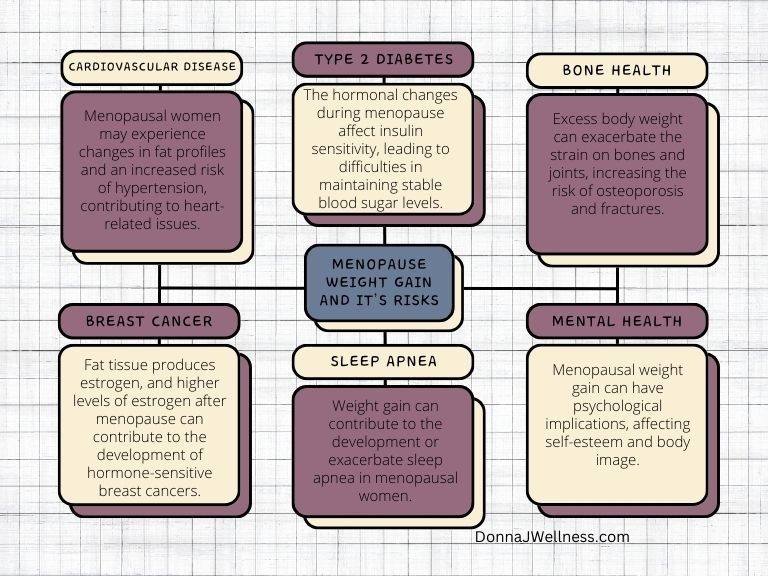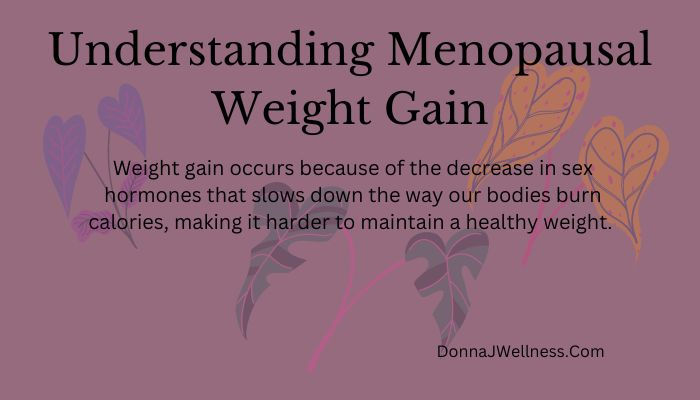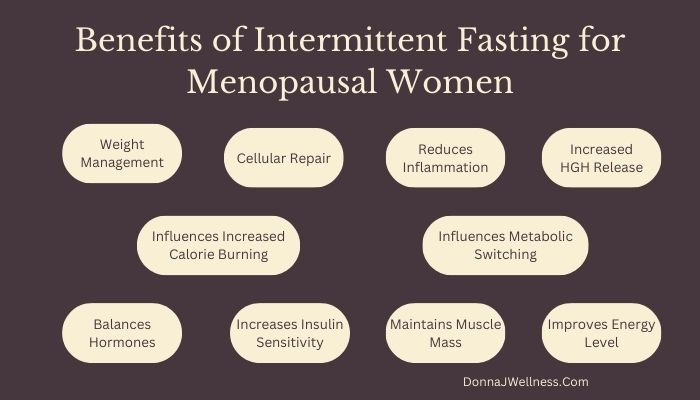The Transformative Power of Intermittent Fasting for Menopause Weight Gain and Symptoms
- Donna J
- Feb 7, 2024
- 9 min read
Updated: Jul 8, 2024

The journey through menopause is a profound and natural transition in a woman's life, yet it often comes with many unique challenges.
One of those significant challenges that many women face during this time is the unwelcome weight gain. As an integrative health coach, I understand the importance of finding holistic and effective solutions to navigate this transformative phase with grace, dignity and a whole lot of sass.
In the realm of wellness, intermittent fasting (IF) has emerged as the easiest approach to managing weight gain and menopause symptoms.
In this blog post, I'll delve into the fascinating world of IF and explore how it can be a beacon of hope for women navigating weight gain and other menopausal changes.
From understanding the intricacies of menopausal weight gain to unlocking the diverse benefits of fasting, this guide aims to empower you with knowledge, insights, and practical tips to make this journey not only manageable but potentially transformative.
Menopause Weight Gain and it’s Risks.
Menopause marks a significant physiological shift in a woman's life, typically occurring in her late 40s or early 50s.
This natural process is characterized by the cessation of menstrual cycles, accompanied by a decline the reproductive hormones estrogen and progesterone. While menopause is a normal and inevitable part of aging, it brings with it a host of changes that can impact a woman's overall health and well-being.
One concern for many women is weight gain, particularly around the abdomen. The hormonal fluctuations during this time can lead to a slowdown in metabolism and changes in fat distribution, making it more challenging to maintain a healthy weight. Additionally, menopause can include a range of symptoms such as hot flashes, night sweats, mood swings, and decreased bone density, further influencing your overall health.
The impact of menopausal weight gain extends beyond mere aesthetics, as it is closely intertwined with various health risks. Excess weight during this phase of life has been linked to:
Cardiovascular disease: Excess weight, especially around the abdomen, is a risk factor for cardiovascular diseases. Menopausal women may experience changes in fat profiles and an increased risk of hypertension, contributing to heart-related issues.
Type 2 diabetes: Menopausal weight gain is associated with insulin resistance, a key factor in the development of type 2 diabetes. The hormonal changes during menopause affect insulin sensitivity, leading to difficulties in maintaining stable blood sugar levels.
Bone health: Decreased estrogen levels during menopause contribute to a decline in bone density. Excess body weight can exacerbate the strain on bones and joints, increasing the risk of osteoporosis and fractures.
Breast cancer: There is evidence suggesting a link between postmenopausal weight gain and an increased risk of breast cancer. Fat tissue produces estrogen, and higher levels of estrogen after menopause can contribute to the development of hormone-sensitive breast cancers.
Sleep apnea: Weight gain, particularly around the neck and throat area, can contribute to the development or exacerbate sleep apnea in menopausal women. Sleep disturbances are common during menopause, and if left untreated, sleep apnea can further impact overall health.
Mental health: Menopausal weight gain can have psychological implications, affecting self-esteem and body image. The emotional impact may contribute to conditions such as depression and anxiety.

Understanding Menopausal Weight Gain
Women going through menopause, often experience changes in their bodies that cause them to gain weight, especially around the belly. This change occurs because of the decrease in our sex hormones estrogen and progesterone and can slow down the way our bodies burn calories, making it harder to maintain a healthy weight.

Hormonal changes during menopause
During menopause, women experience significant hormonal changes. The two main hormones involved are estrogen and progesterone. These hormones, produced by the ovaries, play crucial roles in the menstrual cycle, various aspects of reproductive health, and overall health as well.
As women approach menopause, the production of estrogen and progesterone starts to decline. This marks the end of her reproductive years. The decrease in estrogen levels is especially significant and is associated with various menopausal symptoms.
Factors contributing to weight gain during menopause
There are several factors that contribute to weight gain during the menopausal transition:
Hormonal changes: The decline in estrogen levels during menopause leads fat to be redistributed in the abdomen, which contributes to weight gain.
Decrease in metabolic rate: As women age and go through menopause, their metabolic rate decreases (the number of calories your body needs at rest). This means the body burns fewer calories at rest, making it easier to gain weight, especially if diet and activity levels remain unchanged.
Loss of muscle mass: Aging and hormonal changes lead to a gradual loss of muscle mass. Since muscles burn more calories than fat, a decrease in muscle mass can further contribute to a slower metabolism and weight gain.
Lifestyle factors: Changes in lifestyle, such as decreased movement and less healthy eating habits, can contribute to weight gain during menopause. Factors like increased stress or insufficient sleep also play a role.
Genetic and environmental factors: Individual genetics can influence how the body responds to hormonal changes and weight regulation. Environmental factors, diet, movement, stress, and the toxins in your environment, also contribute to overall weight management.

Importance of addressing weight during menopause
By recognizing the importance of weight management during menopause, women can take proactive steps to adopt a healthy lifestyle.
Addressing weight management during the menopausal transition is crucial for several reasons:
Health risks: Excess weight during menopause is associated with an increased risk of many health conditions, including cardiovascular diseases, type 2 diabetes, and issues related to bone health.
Bone health: Maintaining a healthy weight is essential for supporting bone health. Excess body weight can strain the skeletal system, contributing to osteoporosis.
Emotional well-being: Changes in body weight and composition during menopause can impact self-esteem and emotional well-being.
Energy levels: Maintaining a healthy weight influences energy levels, mobility, and the ability to engage in physical activities.
Quality of life: Addressing weight management contributes to an improved quality of life during and after the menopausal transition.

What is Intermittent Fasting?
IF not just a diet; it’s a lifestyle.
IF is a shift in the normal way we approach eating and the timing of our meals. The IF lifestyle involves cycling between periods of eating and fasting, allowing the body to tap into its innate mechanisms for energy use and cellular repair to keep us healthy and feeling good, and releasing fat stores to lose weight.
The most popular method of this type of fasting involves daily fasting for a set period, typically ranging from 12 to 20 hours. For example, you might eat during an 8-hour window (e.g., 11:00 pm to 7:00 pm) and fast for the remaining 16 hours. Most of your fasting time will be overnight.
In the quest for effective and sustainable solutions to navigate the challenges of menopausal weight gain and its accompanying symptoms, IF shows up as a promising strategy that extends beyond conventional approaches.
One of the ways that IF addresses menopausal weight gain is by influencing hormonal balance.

How intermittent fasting works in the body

IF works by leveraging the body's natural response to periods of eating and fasting.
Here are some of the ways that this type of fasting positively affects the body:
Insulin sensitivity: During fasting periods, insulin sensitivity improves. Insulin is a hormone that helps regulate blood sugar levels and also causes fat storage. Improved insulin sensitivity means the body can use insulin more effectively, leading to better blood sugar control, reduced risk of insulin resistance and less fat storage.
Metabolic switching: IF causes the body to switch between burning glucose (sugar) and fat for energy. In the fasting state, when glucose is not readily available, the body starts breaking down stored fat for energy. This metabolic flexibility contributes to fat loss and improved body composition.
Cellular repair: Fasting triggers a process called autophagy which plays a crucial role in cellular maintenance and repair. It helps remove damaged proteins and organelles, promoting the regeneration of healthy cells and ensuring optimal cellular function. This cellular repair mechanism has many health benefits, such as anti-aging, cancer prevention, improved energy efficiency, and maintenance of healthy nerve and heart cells.
Hormone regulation: Fasting influences the release of hormones that play a role in fat burning, muscle preservation, and overall metabolic health.
Gene expression: IF impacts gene expression related to longevity and disease protection. Some genes associated with cellular repair and stress resistance can increase their number of cell receptors during fasting.
Inflammation reduction: Fasting contributes to a decrease in inflammation. Chronic inflammation is linked to many health issues, and IF’s anti-inflammatory effects offer protective benefits.
Brain health: Fasting supports brain health by promoting the release of brain-derived neurotrophic factor (BDNF), a protein associated with cognitive function, learning, and memory.
Benefits of Intermittent Fasting for Menopausal Women
IF offers several benefits for menopausal women, addressing both weight management and various symptoms associated with the menopausal transition.
Weight management
IF can aid in weight management by promoting fat loss. It can help women navigate hormonal changes during menopause, which can contribute to weight gain, especially around the abdomen.
Influences calorie burning
IF has a significant impact on metabolism, influencing how the body burns calories and utilizes energy.
Metabolic switch
During fasting periods, the body undergoes a metabolic switch, shifting from using glucose (sugar) for energy to utilizing stored fat. This flexibility in energy sources may contribute to better overall metabolic health.
Increased human growth hormone (HGH) release
IF has been shown to increase the release of human growth hormone (HGH), which plays a role in fat metabolism, muscle preservation, and overall metabolic function.
Cellular repair
Fasting triggers processes like autophagy, where the body removes and recycles damaged cells. This cellular repair and renewal can positively impact metabolic health and has been shown to have significant implications for longevity.

Inflammation reduction
Chronic inflammation is associated with various metabolic health issues. IF has been shown to have anti-inflammatory effects, contributing to a reduction in inflammation and its associated risks.
Maintains of muscle mass
Unlike traditional calorie-restricted diets, IF can help preserve muscle mass during weight loss. This is important for maintaining a higher basal metabolic rate, as muscle tissue burns more calories at rest than fat tissue.
Helps balance hormones
IF positively influences hormonal balance, including insulin sensitivity. This can be particularly beneficial for menopausal women as hormonal fluctuations are associated with symptoms such as hot flashes and mood swings.
Increases insulin sensitivity
During periods of fasting, insulin sensitivity improves. This means the body becomes more effective at regulating blood sugar levels, which can be beneficial for metabolic health and may reduce the risk of insulin resistance and type 2 diabetes.
Improved Energy Levels
Improved mitochondrial function and the body's ability to switch between energy sources during IF can lead to increased energy levels and improved vitality, addressing common complaints of fatigue during menopause.
Intermittent Fasting and Menopausal Weight Gain
Time-restricted eating has shown promise in alleviating many menopausal symptoms.
Hot flashes and night sweats: Hormonal fluctuations, particularly the decline in estrogen levels, are often linked to hot flashes and night sweats during menopause. IF ‘s positive influence on hormone regulation, including insulin sensitivity, can contribute to a reduction in the frequency and intensity of these symptoms.
Mood swings and irritability: When hormones aren’t balanced, it affects how our brain chemicals work and make us feel moody and irritable. IF can actually make our brains healthier by releasing molecules that stabilize our mood and make us feel better emotionally.
Insomnia and sleep disturbances: Disruptions in sleep are, unfortunately extremely common during menopause, and hormonal changes play a role in them. IF has been associated with improvements in circadian rhythm and sleep quality, offering relief from insomnia and related sleep issues.
Fatigue and energy levels: Hormonal changes can contribute to feelings of fatigue and decreased energy levels. IF can boost your energy and make you feel more alive by improving how your cells work and making it easier for your body to switch between using sugar and fat for energy.
Cognitive function: Hormonal fluctuations can influence cognitive function and memory during menopause. Fasting can help protect the brain and support clear thinking during menopause. It does this by encouraging the release of something called brain-derived neurotrophic factor (BDNF), which is like a brain fertilizer helping it stay healthy.

Getting Started with Intermittent Fasting
Embracing an intermittent fasting lifestyle to address menopausal weight gain and manage associated symptoms can be an empowering choice for women navigating this phase of life.
Begin by selecting an eating and fasting window that suits your lifestyle and start slowly. If your goal is a 15-hour fasting window, and you only fast overnight for 8 hours, start with pushing breakfast back one hour. As you get comfortable, push it back an hour, and then another, until you reach your goal.
Ease into the fasting routine gradually, allowing your body to adapt. During eating periods, prioritize whole, nutrient dense foods that address menopausal symptoms. Stay well-hydrated and incorporate movement into your life to complement the benefits of intermittent fasting.
Are you tired of battling menopausal weight gain and symptoms? It's time to reclaim your vitality!
As an experienced Integrative Health Coach, I specialize in empowering women like you to thrive through menopause using the transformative power of intermittent fasting.

Why Choose Intermittent Fasting with Me?
IF has truly become a part of my everyday life.
It's not just a routine; it's been my ally in combating brain fog, shedding belly fat, managing hot flashes, and staying focused during the ups and downs of menopause.
I've experienced its positive impact, and I genuinely want to be there for you as you navigate your own journey to overcome these challenges.
Let's work together to make a difference in your well-being.
Schedule a chat today!
Comments